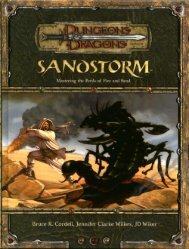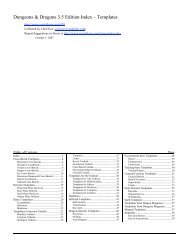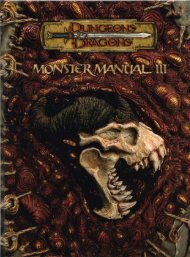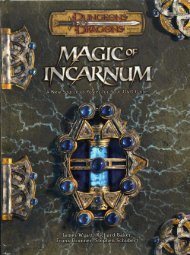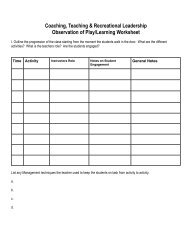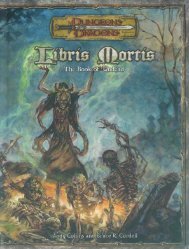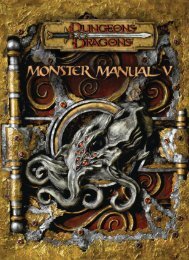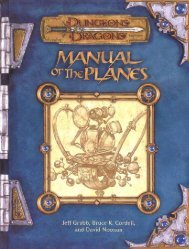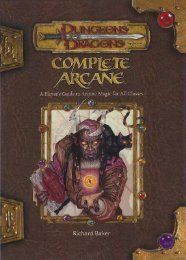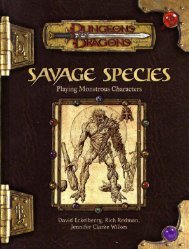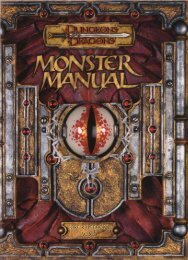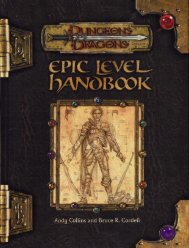CHAPTER 1ELVES16advisor that he shares the leadership <strong>of</strong> the communitywith that person.Successors are <strong>of</strong>ten members <strong>of</strong> the current leader’s familyor inner circle, because they learn early how to manage acommunity <strong>of</strong> highly independent individuals. When thequeen is busy, it’s natural for her to ask her son or consort ifhe can help. The current ruler may also suggest a successor tothe community. Though it is rare for the residents to refusea named successor, they are under no obligation to accepthim or her.Disputes over leadership are rare; when they do occur,they are almost never resolved through violent means.Leaders are not as important to the highly independentelves as they are to members <strong>of</strong> more lawful races, anddisputes over such positions are not worth the risk <strong>of</strong>life. In cases where multiple candidates want a leadershipposition, the candidates present their qualifications tothe community in a large gathering, and the residentschoose between them. Such gatherings <strong>of</strong>ten featureimpassioned oratory on the part <strong>of</strong> the candidates, andoccasionally a quest. Should a contest be heated enoughto sharply divide the community, one <strong>of</strong> the candidatesmay choose to leave, taking his or her followers along t<strong>of</strong>ound a new community.An elf king or queen typically rules over only one community.No overking, emperor, or other such ruler exists,because central authority is foreign to the chaotic elven soul.Each community is self-contained, but it may trade withother elf cities and even the settlements <strong>of</strong> other races. Still,should it become necessary, each community can survive onits own. An elf ruler may make alliances on behalf <strong>of</strong> his owncommunity but not on behalf <strong>of</strong> others. Such a decentralizedstructure <strong>of</strong>ten confounds other races; to the elves, it seemsmerely practical.An elf ruler is expected to mediate major disputes, planfor the community’s welfare, see that expansion does notthreaten the natural resources <strong>of</strong> the area, and ensure for aproper defense. He can require each individual to contributeto community stores as needed and call forth militias for thecommon defense. He represents the community in its dealingswith other races and other elf settlements. Nevertheless,he is also free to pursue his own interests when time permits,just like any other elf. Furthermore, unless he chooses toadventure, he rarely gains significantly more wealth thanany other elf.As might be expected, elf rulers generally consult a cadre<strong>of</strong> elders or advisors when making their decisions. However,anyone in the community who wants to advise the ruler ona particular topic may do so. The ruler is free to consult withthose whose opinions he most respects, and most rulers tendto consult the same individuals over and over again. There isno set limit to the number <strong>of</strong> advisors a king or queen mayhave, and the number typically fluctuates over time. Manyrulers consult family members for advice, and a few alsoregularly consult with individuals who oppose them, in orderto demonstrate the fairness expected <strong>of</strong> a ruler.COMMUNITY STRUCTUREA noble, advised by an informal group <strong>of</strong> confidants, typicallyheads an elf community. The noble’s title varies withthe size <strong>of</strong> the community; a noble governing a village ortown is generally known as a lord or lady, the ruler <strong>of</strong> acity is a prince or princess, and the ruler <strong>of</strong> a larger realmis a king or queen. A ruler’s advisors are usually known aselders, regardless <strong>of</strong> their age. They may or may not be familymembers, and they need not all be elves. In particular, rulerswho have tasted the adventuring life <strong>of</strong>ten invite their oldcompanions to live in the elf community, or to enjoy longvacations there. Such companions are <strong>of</strong>ten counted amongthe ruler’s advisors.OfficialsThough the ruler is nominally in charge <strong>of</strong> all major functions<strong>of</strong> the community, including food, shelter, defense,judiciary, and training, the day-to-day functions <strong>of</strong> thesetasks are delegated to others within the community. Almostevery community has a captain <strong>of</strong> the watch, a master builder,a stores master, a guardian <strong>of</strong> nature, a keeper <strong>of</strong> the lore, amaster <strong>of</strong> arms, and a high priest. Technically, all these <strong>of</strong>ficesexcept high priest are bestowed by appointment, but in realitythe elf who most <strong>of</strong>ten performs the task is given the title. The<strong>of</strong>ficial then holds the title until he or she resigns from thepost or is found incompetent by the ruler.Captain <strong>of</strong> the Watch: This <strong>of</strong>ficial commands the patrolsthat roam the area around the settlement. She ensures that thepatrols evenly cover the desired area, receives their reports,and passes along any useful information to the ruler andelders. When large gatherings occur, the captain <strong>of</strong> the watchmay assign a patrol <strong>of</strong> guards to keep the peace.Watch patrols normally consist <strong>of</strong> a handful <strong>of</strong> elf warriorsled by a slightly more experienced warrior or fighter.The patrols keep watch for intruders, predatory beasts, andanything unusual, such as trees dying for no apparent reason.No creature is challenged unless it appears likely to approachwithin a defined distance <strong>of</strong> the elf community. A challengeusually consists <strong>of</strong> a warning shot accompanied by a verbalwarning to stay clear, if the intruder is a sentient being. Watchparties may be assigned to hunt in the forest if supplies <strong>of</strong>meat are low in the community.Master Builder: The master builder coordinates the buildingwithin an elf community. Anyone wishing to build a dwellingor other structure must consult with him and convincehim <strong>of</strong> the suitability <strong>of</strong> the chosen site before building maycommence. The master builder ensures that new buildings donot crowd others and fit in well aesthetically with the town.If requested to do so, he may also provide advice and guidancein the construction process. The master builder decideswhen a community has reached its maximum sustainablesize based on the available resources. When this occurs, nomore new houses may be built in that area. Elves wishing tobuild new dwellings must depart and find another locationin which to found a community.
Stores Master: Charged with keeping sufficient foodand water stores to sustain the community through periods<strong>of</strong> drought or other disaster, the stores master periodicallychecks the community’s stores <strong>of</strong> dried meat and fruit,root vegetables, and grain, as well as the cisterns in whichrainwater is stored. She also checks the stored provisions toensure that they have not spoiled, been poisoned, or otherwiserendered unusable. When supplies dip below the levelsneeded to sustain the entire community for three months,the stores master reports the deficit to the ruler, who sendsout parties to search for food.In some communities, the stores master also monitorsstores <strong>of</strong> nonedible supplies such as lamp oil, tindertwigs,alchemical items, parchment, ink, tools, and weapons. Othercommunities delegate the responsibility for such itemsto different <strong>of</strong>ficials or do not keep track <strong>of</strong> them at all,trusting to individual citizens to meet their own needs forthese materials.Guardian <strong>of</strong> Nature: This <strong>of</strong>ficial is responsible for ensuringthat the elves live harmoniously with nature in their area.Often a druid, he oversees the community’s gardens and caresfor the local wildlife. He also ensures that the communityreplenishes what it takes and that its presence does not harmthe natural world.Keeper <strong>of</strong> the Lore: The keeper <strong>of</strong> the lore gathers andarchives magical knowledge and advancements from thecommunity and records them for posterity. He keeps thescrolls and tomes that contain this knowledge in a large,central library that is open to all citizens. On occasion, thelibrary may be made available to outsiders with special needs,but only with the permission <strong>of</strong> the keeper or the ruler.Master <strong>of</strong> Arms: The master <strong>of</strong> arms trains the young elvesin the community in the use <strong>of</strong> weapons and teaches themself-defense. Under her tutelage, they learn to move soundlesslythrough the woods and melt back into the trees afterattacking. She also plans expeditions for hunting, exploration,or other purposes. In some communities, the master <strong>of</strong> armsmanages the armory, ensuring that the weapons used by thewatch patrols are honed and ready for use at all times.High Priest: The high priest <strong>of</strong> an elf community is usuallythe senior cleric <strong>of</strong> Corellon Larethian, though the post canbe held by a cleric <strong>of</strong> any deity revered in the community. Thehigh priest coordinates the functions <strong>of</strong> the various temples toensure that the spiritual needs <strong>of</strong> the community are met. He<strong>of</strong>ficiates at most <strong>of</strong> the weddings and funeral services, tailoringthem for the specific individuals and families involved.In times <strong>of</strong> war or hardship, the high priest coordinates notonly the clerics <strong>of</strong> his own church but also those <strong>of</strong> the otherchurches in the community to provide healing, emergencyfood, and other aid.JudiciaryWhen a dispute arises among elves that the participantscannot resolve, they may bring the matter to any three or moreelders whom they can convince to gather in the same place.All parties to the dispute must agree on the elders chosen.In most communities, each party to the dispute choosestwo seconds who are familiar with the situation. One <strong>of</strong> theseseconds presents the argument to the elders on behalf <strong>of</strong> theplaintiff or defendant, who remains unnamed. In this way, theelders theoretically do not know for whom they are deciding.The seconds present evidence and witnesses as required, andthen the elders render a decision that is considered binding.Only the ruler may overturn the decision <strong>of</strong> the elders, andhe may choose to hear or not hear an appeal.ELVEN FAMILIESVisitors to elf communities are <strong>of</strong>ten bewildered about theapparent lack <strong>of</strong> family life. In truth, elves love their familiesas much as humans or dwarves do; they simply do not feel theneed to spend all their time with their relatives. After all, ina life that lasts hundreds <strong>of</strong> years, there’s plenty <strong>of</strong> time forfamily and other interests as well.Wedded elf couples usually establish a joint home, thoughsome also maintain individual residences to which they canretreat whenever they want some distance from their spouses.Unwedded couples sometimes establish joint homes, butthey more <strong>of</strong>ten continue to maintain their own houses andcohabit in one or the other.A pregnant elf is expected to limit her activities as muchas necessary to ensure the birth <strong>of</strong> a healthy child. Becausechildren are not common among elves, each new life is preciousto the community. Thus, everyone pitches in to care forthe expectant mother and her child after the child’s birth.Children are always acknowledged by both parents andwelcomed by the community in a celebration. Half-elf childrenborn within the community are <strong>of</strong>ten welcomed withas much joy as full elves. When a child is born, the parentsusually rear her jointly for the first ten years or so <strong>of</strong> herlife, whether they are wedded or not. Thereafter, the childbecomes the responsibility <strong>of</strong> the whole community. Thechild lives in the home <strong>of</strong> one or the other parent (whicheverwishes to provide the child with a home) but is free toplay with other elf children and visit with other adults toher heart’s content. Members <strong>of</strong> the community take turnswatching over the children at play and ensuring their safety.Any adult may teach or discipline any child, and everyonein the community knows who every child’s parents are.Upon reaching the age <strong>of</strong> 20, a child is usually fosteredout to an older relative, either in the same community oranother. This relative is one who has the time and energyto teach the youngster an advanced craft. A child may befostered with several relatives before finally coming <strong>of</strong> age,learning different skills and family lore from each. It’s notuncommon for elves to repeat this process <strong>of</strong> fostering andstudying for the first hundred years <strong>of</strong> their lives. However,in particularly threatening times, the need for warriors maylead to elf youths taking on adult responsibilities almost asquickly as humans might.Upon coming <strong>of</strong> age, a young elf is typically <strong>of</strong>fered a choice<strong>of</strong> homes by parents and the family members who fosteredher. She may choose among these <strong>of</strong>fers or build her ownCHAPTER 1ELVES17
- Page 2: C R E D I T SD E S I G NSKIP WILLIA
- Page 7 and 8: no elf could predict which memory w
- Page 9 and 10: premium. Thus, each individual can
- Page 11 and 12: The elves have raised one form of e
- Page 13 and 14: do spend time away from one another
- Page 15: espects during this time, and those
- Page 19 and 20: would be the birthright of any full
- Page 21 and 22: of feet above the forest floor. Mos
- Page 23 and 24: Cleric Training: More than any othe
- Page 25 and 26: ELF HISTORYAND FOLKLOREThe elves cl
- Page 27 and 28: along with her son Hionyron, who wa
- Page 29 and 30: and return her to her people.” In
- Page 31 and 32: Table 1-3: Suffixesd% Suffix Meanin
- Page 34: CHAPTER 1ELVES34tri-level tree home
- Page 37 and 38: Illus. by C. Lukacsurious and activ
- Page 39 and 40: the reason for the farmer’s hospi
- Page 41 and 42: Halflings make a visitor feel welco
- Page 43 and 44: Halflings are usually pleasant trav
- Page 45 and 46: Halflings are as eager to experienc
- Page 47: A chief or elder heads each clan, c
- Page 50 and 51: CHAPTER 2HALFLINGS50away from their
- Page 52 and 53: CHAPTER 2HALFLINGS52Illus. by S. Wo
- Page 54 and 55: CHAPTER 2HALFLINGS54to tell how lon
- Page 56 and 57: CHAPTER 2HALFLINGS56the underbrush
- Page 58 and 59: CHAPTER 2HALFLINGSIllus. by T. Baxa
- Page 60 and 61: CHAPTER 2HALFLINGS60Donta muden sit
- Page 63 and 64: and one or more bedrooms. All have
- Page 65 and 66: Illus. by C. Lukacshe cliff-dwellin
- Page 67 and 68:
Personality: Raptorans have a reput
- Page 69 and 70:
PSYCHOLOGYSome outsiders who have h
- Page 71 and 72:
for making a point through a logica
- Page 73 and 74:
flock for debate, sometimes invitin
- Page 75 and 76:
its eggs. At such times, they toler
- Page 77 and 78:
THE RAPTORAN PANTHEONThe typical ra
- Page 79 and 80:
Prayers: Prayers to the Stormfather
- Page 81 and 82:
“Welcome, friend,” said a human
- Page 83 and 84:
year since, and they share the care
- Page 85 and 86:
D: Domain spell. Domains: Protectio
- Page 87 and 88:
characteristics are summarized in t
- Page 90 and 91:
CHAPTER 3RAPTORANS90Authority Figur
- Page 92 and 93:
CHAPTER 4OTHERRACES92a humanlike ra
- Page 94 and 95:
CHAPTER 4OTHERRACES94ment, finding
- Page 96 and 97:
CHAPTER 4OTHERRACES96Illus. by S. B
- Page 98 and 99:
Table 4-1: The CentaurHit Base Atta
- Page 100 and 101:
CHAPTER 4OTHERRACES100nomadic gnoll
- Page 102 and 103:
Table 4-2: The GnollBase Fort Ref W
- Page 104 and 105:
CHAPTER 4OTHERRACES104of the humano
- Page 106 and 107:
CHAPTER 4OTHERRACESsneak attack, bu
- Page 108 and 109:
CHAPTER 5PRESTIGECLASSES108Shadowda
- Page 110 and 111:
CHAPTER 5PRESTIGECLASSESIllus. by W
- Page 112 and 113:
CHAPTER 5PRESTIGECLASSES112the foll
- Page 114 and 115:
CHAPTER 5PRESTIGECLASSES114Entry Re
- Page 116 and 117:
CHAPTER 5PRESTIGECLASSESIllus. by J
- Page 118 and 119:
CHAPTER 5PRESTIGECLASSESLUCKSTEALER
- Page 120 and 121:
CHAPTER 5PRESTIGECLASSESIllus. by J
- Page 122 and 123:
CHAPTER 5PRESTIGECLASSESEL 11: Kuly
- Page 124 and 125:
CHAPTER 5PRESTIGECLASSES124spellcas
- Page 126 and 127:
CHAPTER 5PRESTIGECLASSES126save bon
- Page 128 and 129:
CHAPTER 5PRESTIGECLASSESmore than o
- Page 130 and 131:
CHAPTER 5PRESTIGECLASSES130raptoran
- Page 132 and 133:
CHAPTER 5PRESTIGECLASSES132Table 5-
- Page 134 and 135:
CHAPTER 5PRESTIGECLASSESfriendly—
- Page 136 and 137:
CHAPTER 5PRESTIGECLASSESYou no long
- Page 138 and 139:
CHAPTER 5PRESTIGECLASSES138small fe
- Page 140 and 141:
CHAPTER 5PRESTIGECLASSES140ranger.
- Page 142 and 143:
CHAPTER 5PRESTIGECLASSESIllus. by T
- Page 144 and 145:
CHAPTER 5PRESTIGECLASSESEncountersP
- Page 146 and 147:
CHAPTER 6CHARACTEROPTIONS146Conditi
- Page 148 and 149:
CHAPTER 6CHARACTEROPTIONS148If the
- Page 150 and 151:
CHAPTER 6CHARACTEROPTIONSIllus. by
- Page 152 and 153:
CHAPTER 6CHARACTEROPTIONSIllus. by
- Page 154 and 155:
CHAPTER 6CHARACTEROPTIONSIllus. by
- Page 156 and 157:
Table 6-3: Elf Ranger Racial Substi
- Page 158 and 159:
Table 6-5: Halfling Druid Racial Su
- Page 160 and 161:
CHAPTER 6CHARACTEROPTIONS160Table 6
- Page 162 and 163:
Class SkillsRaptoran fighter substi
- Page 164 and 165:
CHAPTER 7EQUIPMENTAND MAGICIllus. b
- Page 166 and 167:
CHAPTER 7EQUIPMENTAND MAGIC166anoth
- Page 168 and 169:
CHAPTER 7EQUIPMENTAND MAGICTable 7-
- Page 170 and 171:
CHAPTER 7EQUIPMENTAND MAGICIllus. b
- Page 172 and 173:
CHAPTER 7EQUIPMENTAND MAGICIllus. b
- Page 174 and 175:
2nd-Level Ranger SpellWoodland Veil
- Page 176 and 177:
WOODLAND VEILIllusion (Glamer)Level
- Page 178 and 179:
CHAPTER 8CAMPAIGNS INTHE WILD178THE
- Page 180 and 181:
CHAPTER 8CAMPAIGNS INTHE WILDIllus.
- Page 182 and 183:
CHAPTER 8CAMPAIGNS INTHE WILD182(lo
- Page 184 and 185:
CHAPTER 8CAMPAIGNS INTHE WILD184Ski
- Page 186 and 187:
CHAPTER 8CAMPAIGNS INTHE WILD186Tab
- Page 188 and 189:
CHAPTER 8CAMPAIGNS INTHE WILDIllus.
- Page 190 and 191:
CHAPTER 8CAMPAIGNS INTHE WILDIllus.
- Page 192:
APPENDIX19261 Guards are needed to
- Page 195 and 196:
2THE CLIFFThe Rifinti dwelling lies
- Page 198 and 199:
supplies for craftwork. Lamps fuele
- Page 200 and 201:
Nae’fidrim: Female owl companion;
- Page 202 and 203:
Creatures: A cleric is always on du
- Page 204 and 205:
cloak of elvenkind, oil of magic we
- Page 206:
aptoran contraries. If visitors can



